city and far beneath it.These 105 images are a salute to roof topping and underground tunnel urban explorers across the globe.
Never Dare A Hacker
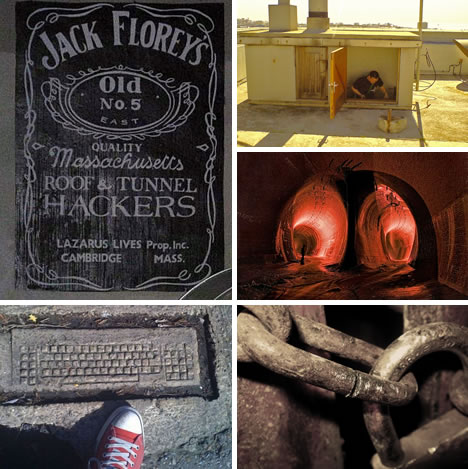
(image credits:wikipedia,mallix,Vanishing Point,Break,deadmind)
Like baiting a hacker with the phrase “unhackable,” roof and tunnel hackers take it as a personal challenge that a roof or a utility tunnel is not accessible. Furthermore, labeling any place with “unauthorized exploration is prohibited” is somewhat of a dare to be proven wrong. It moved past college pranks. Urban explorers picked up their cameras and the flag of exploring inaccessible and rarely-seen places. Never dare a hacker . . .Roof & Tunnel Hackers
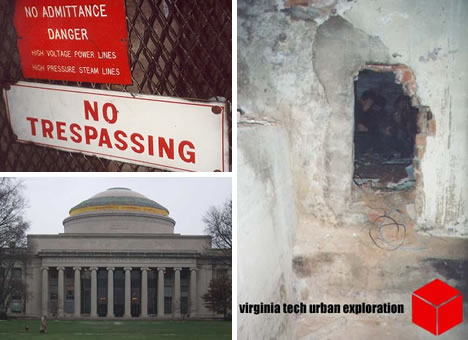
(image credits:infiltration.org,Virginia Tech Steam Tunnels,hacks.mit.edu)
Born in the 1970s from the game ADVENT and MIT, vadding started as exploring underground tunnels and accomplishing collegiate pranks on roofs. MIT pulled off many pranks on top of a university building. They and other campuses explored underground utility spaces like steam tunnels. Participants learned the art of lock picking or of finding an unsecured entry point to gain access. One motto whispered then is still whispered now, “Don’t ruin it for all of us.”Invisible Frontier
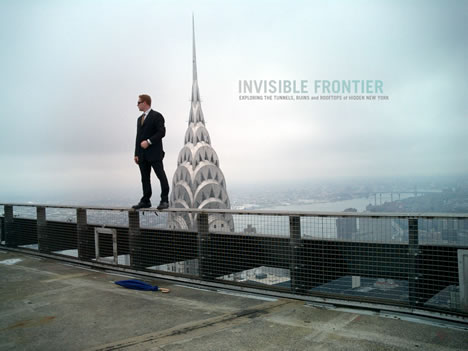
(image credits:Jinx Magazine)
Roof hacking shifted as more urban explorers enjoyed taking photos of the skyline. They shared their views from the top on down through the building. Both roofing high above the ground and urban spelunking became a new and invisible frontiers to be explored.Under or Above
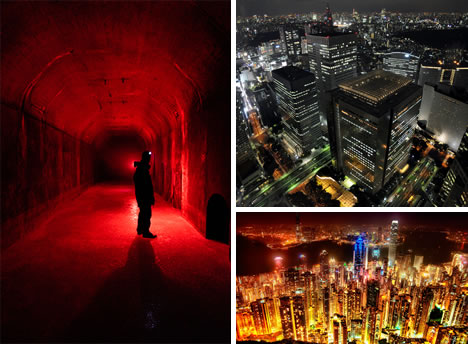
(image credits:Jasmin Cormier,caribb,sprengben)
Most of this exploration takes place in abandoned places where there are security guards to dissuade entry. Underground exploration might be accessed through a maintenance door, manhole, or mine shaft. Accessing a roof generally involves climbing an exterior ladder, up through a trapdoor, or flights of stairs.No Access To Roof
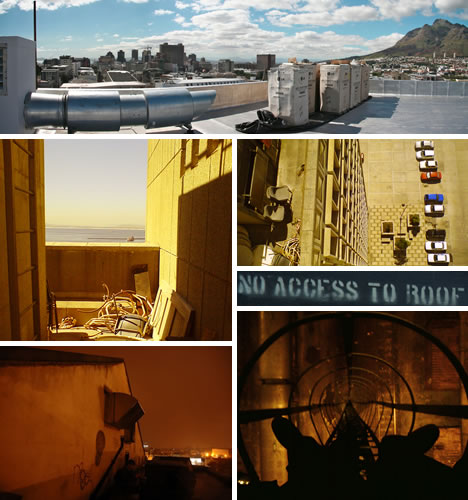
(image credits:mallix,mallix,mbp,28 Days Later,deadmind)
No access to roof, huh? We’ll just see about that. However, with heightened security worldwide, gaining access to a flat roof is not a piece of cake either. For those explorers with the hunger for it, where there’s a will, there’s a way. Most of the top images were taken after explorers infiltrated the Customs Building in Cape Town, South Africa.Like Parking of Old…
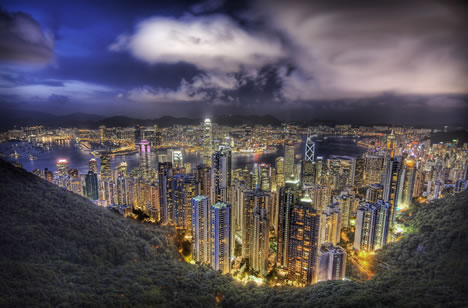
(image credits:Stuck in Customs Trey Ratcliff)
Once upon a time, couples parked high above their city or town at some type of lover’s lookout. You can be sure it was not all about the view. There was a thrill associated with it. It’s also thrilling to some explorers to view the city below, but they do it in the midst of the urban jungle and not far removed like from a lover’s lookout. Roof hacking grew in popularity and the name morphed again to roof topping.Rooftopping
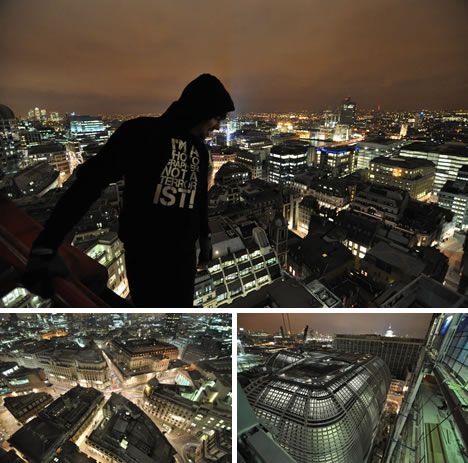
(image credits:Bradley Garrett)
A brilliant point was made on Bradley L. Garrett’s site with both words and the stunning photos above. Notice the shirt, “I’m a photographer. NOT a terrorist!” Some people have a passion to explore and to capture those moments far above the busy world below. It’s not at all about vandalism. It’s also not like they are cat burglars. Despite the safety risks, putting aside arguments of possible accidents and lawsuits, what harm are roof toppers doing? They meet the challenge of infiltrating the roof, get their adrenaline rush, and share their awesome views with us through pictures.Roof Silos
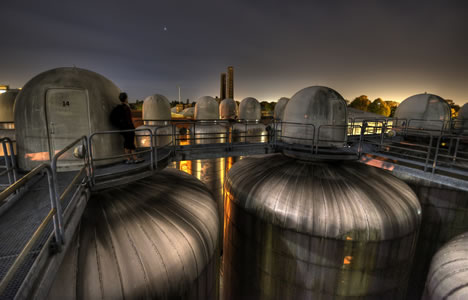
(image credit:pixdaus)
Get in. Get it done. Get out. Due to the murky legalities of it, roof topping photographers rarely release detailed reports of the pictured location. Nor do they go about shouting their names and the names of their comrades. Again, somewhat like computer hackers, they find a way to meet the challenge and share the details with a select few like-minded explorers.Roof Tops
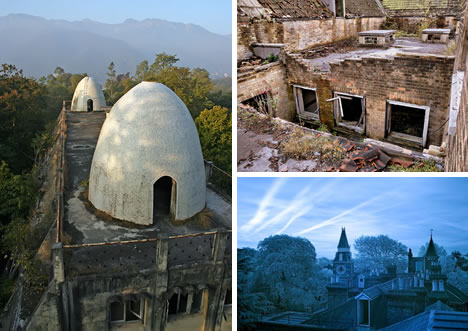
(image credits:danila85,Urban~Spaceman,opacity)
You can practically go around the world through rooftop views. The rounded domes are located at Maharishi Mahesh Ashram in India where the Beatles wrote most of their White Album. The top right image is from a roof overlooking the abandoned kitchens at a Royal Air Force Base in Lincolnshire, England. The bottom right picture was taken from the rooftop of Normansfield Hospital in the UK, looking Toward the Thames.Abandoned City – Al Qsar – Egypt
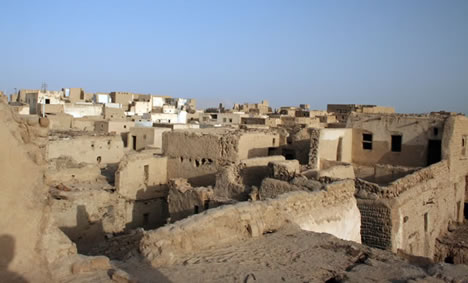
(image credits: Derelict Places)
Roof topping in Egypt, this is the view over the abandoned medieval city of Al Qasr. This mud-architecture in the Dakhla Oasis is open to tourists. Down below, there is an olive press and a catapult that still works. The streets are narrow, made for carts and not cars.Rooftop Views

Since tour maps are not handed out at the door, rooftop views help explorers get their bearings. The left shows the River Bend from the Hotel Sterling. On the right is the Labyrinth below at Eastern State Penitentiary.

This gorgeous capture is from above Agios Theodori Church at Firostefani, Santorini. The brilliant blue water around the small Greek Island of Therasia provides a stunning backdrop.
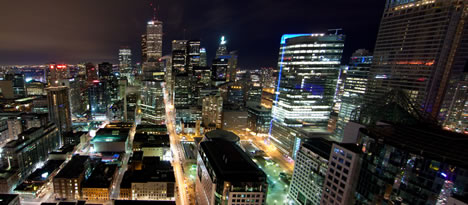

(image credits:opacity,opacity,Marcel Germain,Derelict Dream,Derelict Dream)
From the Urban Exploration Photography site, Derelict Dream, there are great rooftopping and tunneling images. Some are dizzying above the distorted city below. The bottom urban image, from high above Toronto, is summed up with lyrics from Lord of the Rings. Do not look down. Nor step too close. The silence will take you. It will swallow you whole.Tower Cranes & Other High Places

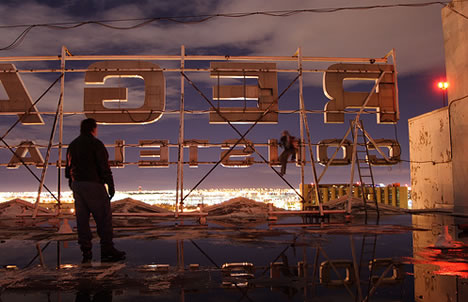
(image credits:Derelict Dream,squirrel brand,Derelict Dream,squirrel brand)
Roof hacking sometimes involves other than roofs. Any high point, such as tower cranes, provide stunning views of the city landscape below. The city sign is being used as a jungle gym and lookout. Urban explorer HI-LITE specializes in shooting photographs from both extremes, high above the city or deep below in underground spaces.Different Perspectives
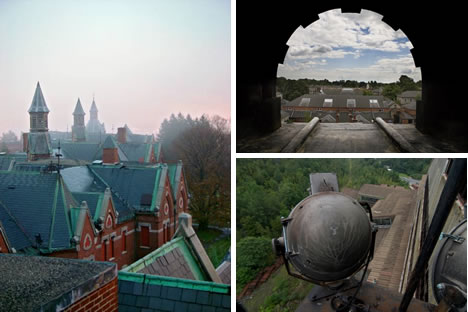
(image credits:opacity,opacity,opacity)
Unless you are an urban explorer, then rooftop views give a different perspective than most people normally see. On the left is a rooftop view from now demolished insane asylum Danvers State Hospital in Massachusetts. The top right is looking out a cupola at psychiatric Severalls Hospital in Essex, UK. The spotlight was at Old Saint Nicholas Coal Breaker. After demolition, these views are something that cannot be captured or shared again.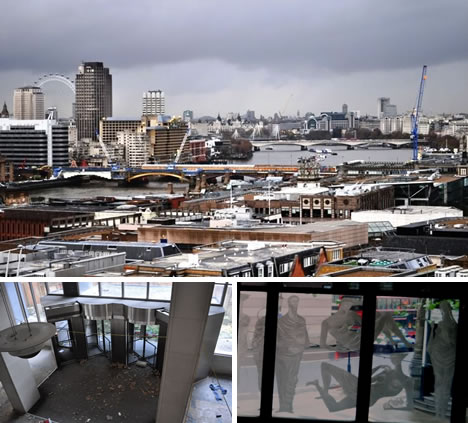
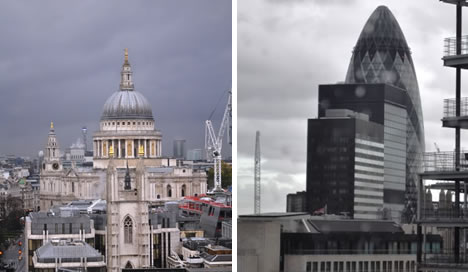
(image credits:28 Days Later)
These were taken from Bucklersbury House in London. Landmarks surrounded this building which was marked for demolition. Construction started on Bucklerbury House in 1953 and was completed in 1958. There were 14 Floors. During construction, the remains of the Roman Temple of Mithras were discovered.Wonder Awaiting Inside
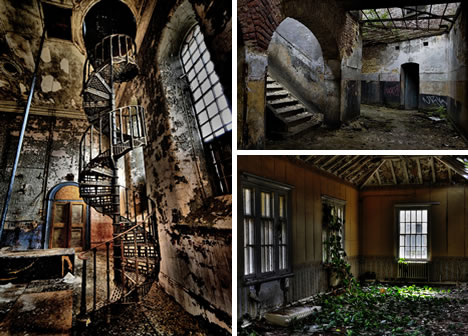
An urban explorer never quite knows what will be awaiting them during an infiltration. The spiral staircase is at Maltings “S” and titled Elegance Unravelling. The top right is the Shedding Skin of abandoned Fort de la Chartreuse in Liège, Belgium. Nature is reclaiming the communal area at Asylum “W.”
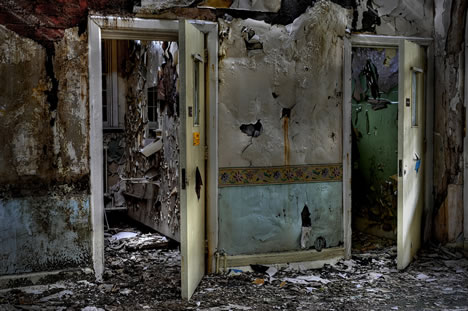
(image credits:Urban~Spaceman,opacity,Urban~Spaceman,Urban~Spaceman)
This is the Presidential Suite at Asylum “W.” The beautiful decay can also be dangerous. The roof is falling in and the floorboards give way beneath weight of explorers. The brick walls are reportedly “spongy,” sinking if leaned upon and then springing back when weight is removed.When Only Bones Remain . . .
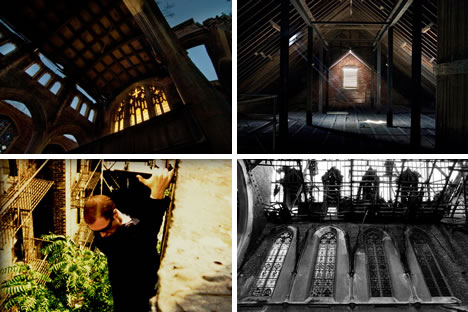
(image credits:opacity,opacity,Jinx Magazine,opacity)
There is a great deal of danger in urban exploration. There is risk of being injured as well as the thrill of exploring without being caught. Sometimes the roof is caving in so that only a carcass remains. Sometimes there are opening in the bones of the building to gain entrance. Sometimes an explorer has to find another way . . . like gaining access through an underground tunnel.Down Into The Underground
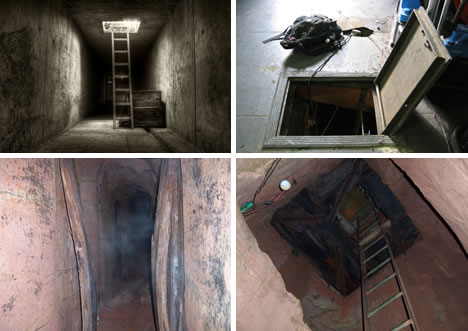
(image credits: 5y12u3k,mallixerisdiscord)
Tunnel hacking was also called urban spelunking. Tunneling can involve climbing through a hatch or trapdoor. The bomb shelter on the bottom in located in Gastonia. There is a creepy fog inside the underground tunnels. “The beams are buckling, not under the weight of over fifteen feet of earth, but under their own weight.” Since the rotten wooden supports crumble when touched, perhaps that signals the time to climb up the ladder and get out?Tunnel In
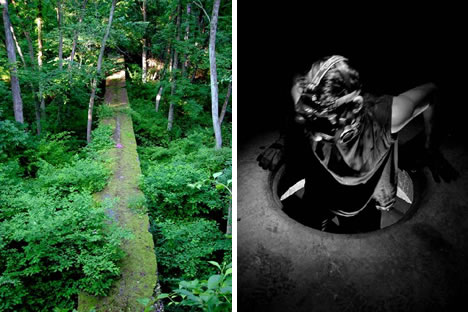
(image credits:opacity,opacity)
Camp Bluefields in New York have the Tweed Tunnels. The long concrete tunnels were below the Tweed shooting range during WWI. Although the tunnels were to safely transport troops underneath the range and to prevent anyone from accidentally being shot, Tweed was abandoned because soldiers hit nearby houses and civilians. Climb in or climb out of a tunnel through manholes such as at Kings Park Psychiatric Center. The abandoned psychiatric hospital in New York is reportedly “haunted.” It is frequently explored by paranormal and urban photographer enthusiasts.Tunnel Purposes
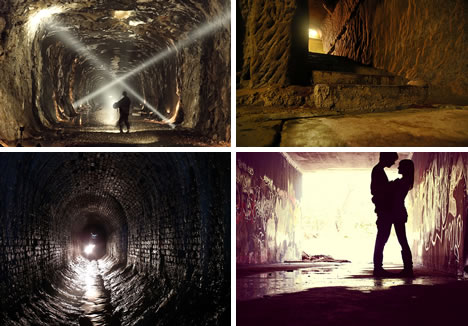
(image credits:vogelium,knaakle,jimgilletteue,pixdaus)
Similar to caving, the world is different in tunnels below the surface. There are abandoned underground railroad tunnels like in New Jersey. The tunnel on the top right is in Okinawa. “The navy put pickaxes into the enlisted men’s hands and they went to work on the tunnels.” Another type of underground tunnel is a drain like in Manchester. For those explorers brave enough to enter, tunnels offer great adventures of all kinds.Dungeon Tunnels or Armenia Cavern
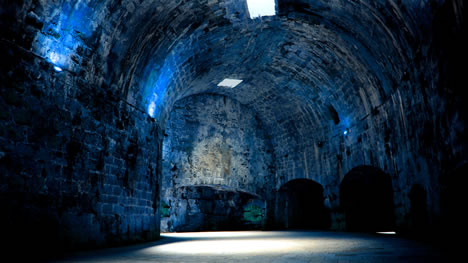
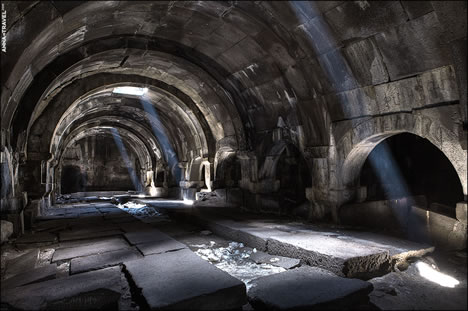
(image credits:Marcel Germain,pixdaus)
The top tunnel is actually a dungeon in Greece. It is within a Venetian medieval fortress in Herakleio, Crete. The bottom is a tunnel tagged only as “Armenia Cavern.”Tunnels
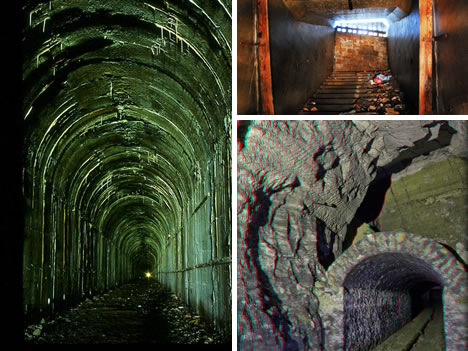
(image credits:dalerail,esprit_de_sel,phill.d)
Tunnel hackers always take a chance of the tunnel collapsing and burying them. The large concrete tunnel on the left is in Washington. Cascade Tunnel on Stevens Pass is in danger of a serious cave-in. Secrets stairs collect trash from people walking above the Dodge Hill deep level shelter in Stockport, England. If you have red-cyan glasses on hand, you can see the 3D quarry tunnel.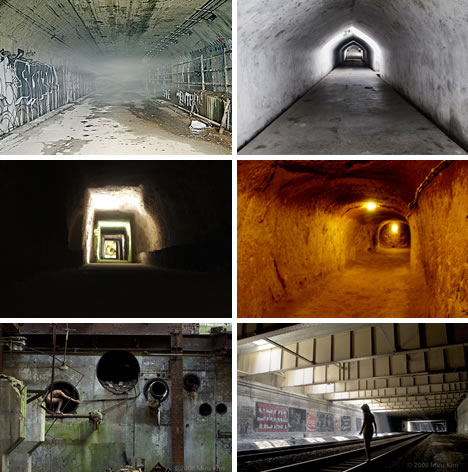
(image credits:jasmincormier,SiamEye,scpgt,curiousexpeditions,iainclaridge,jihoon-kim)
In Wellington, the mists drift through the underground tunnel. At top right, a tunnel runs beneath a mosque in Jogja, India. There are long, dark, and scary World War II bunker tunnels in Syracuse, Sicily. On the middle right is an ancient tunnel which is eight levels below the surface of Kaymakli, Turkey. It is the largest underground city in Cappadocia. For a different sort of underground adventure, Miru Kim visits tunnels in the nude to be photographed.Hazards in Tunnels
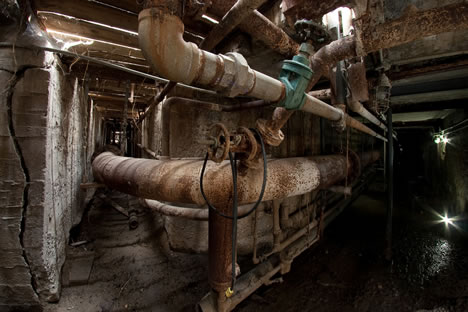
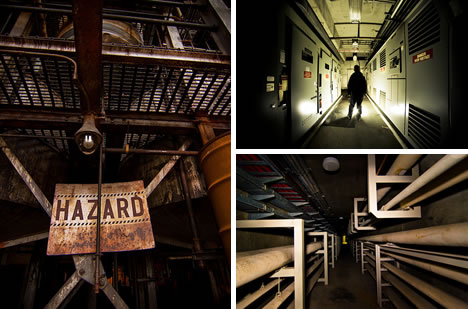
(image credits:squirrel brand,Derelict Dream,Derelict Dream,squirrel brand)
Tunnel hacking became popular in steam tunnels under college campuses. Entry is often made through a manhole, an unsecured entry point, or a door to a mechanical room. Long ago, roof and tunnel hackers from MIT had an infamous lock picking book. Like any abandoned or infrequently accessed area, wildlife can take shelter. There are many hazards in steam tunnels or other underground infrastructures not meant for public access. Exploring maintenance shafts is also called shafting.Drains by HI-LITE
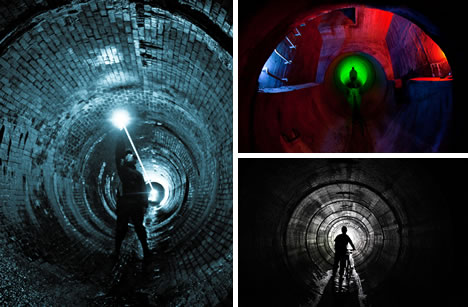
(image credits:squirrel brand,squirrel brand,Derelict Dream)
HI-LITE who presents sensational views from high above ground also took these storm drain shots. Underground tunnels have a tendency to be very dry or flooded. Besides the legal dangers in urban exploring, traveling through storm drains usually involves getting wet and dirty.Ural in Slyudorudnik
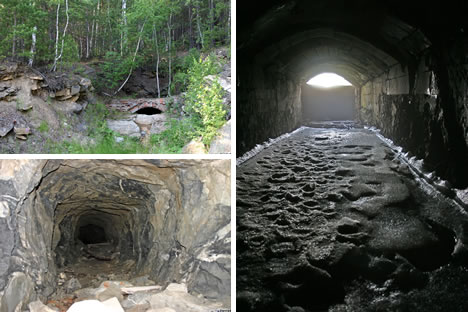
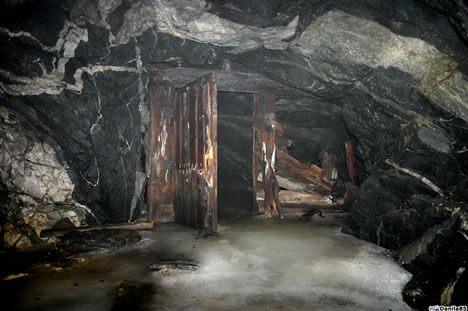
(image credits:danila85)
In Slyudorudnik, Russia, mine tunnels run under the Ural Mountains. These underground tunnels have suffered floods, landslides, and provide shelter for hosts of bats. Stalagmites and stalactites are glacier cold and formed from ice. The flooded floor can be frozen solid or slick and mushy. There are several partially closed tunnels which require careful climbing. Inside the mine is otherworldly and deadly; boulders fall from the ceiling and could trigger a cave-in.Ice Tunnel
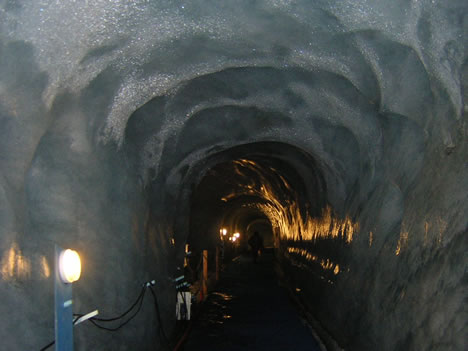
(image credit:snarkhunt)
High in the Rhône-Alpes, this ice tunnel runs through Chamonix-Mont-Blanc, France. The Ice Cave is carved every year into the heart of the glacier. The photographer remarked, “It’s spooky to imagine people hacking their way into a goddamn glacier and doing this by torch.”Stephenson’s Tunnel
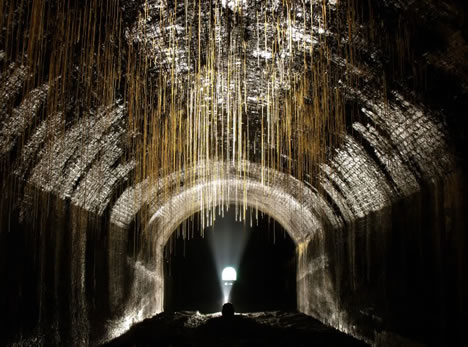
(image credit:28 Days Later)
Urban exploration forum, 28 Days Later, often posts reports after an infiltration of these alien-like landscapes. This is Stephenson’s Tunnel, a part of Wapping Tunnel in Liverpool, England. It closed in 1972, but it was the first tunnel in the world to be bored under a metropolis. Stalactites hang from the ceiling. In the pitch blackness, be careful of huge holes in the steam tunnel floor.Underground Boating – Castle Moat Bristol
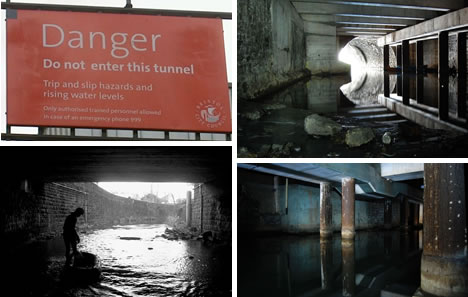
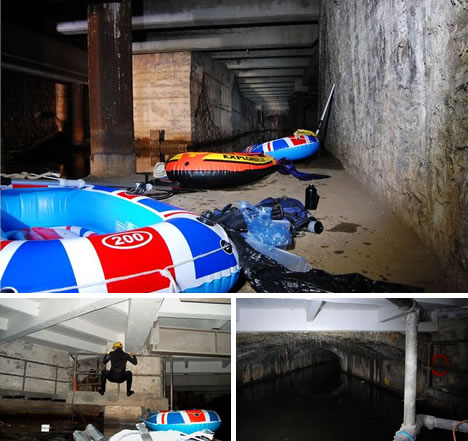
(image credits:28 Days Later)
This time, 28 Days Later donned wetsuits and grabbed paddles for an underground boating excursion in Castle Bristol’s moat. Although navigating underground in the moats of castles may not be the most common adventure, inflatable boats are often used in flooded underground tunnels.Tunnels: You Never Know What Creepy Things…
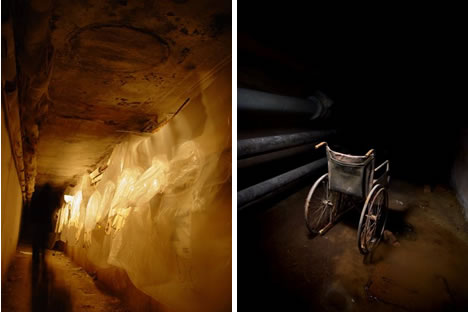
(image credits:opacity,opacity)
Explorers never know what creepiness they might encounter in these underground tunnels. At Danvers State Hospital, on the left, the film crew of Session 9 hung asbestos suits in the tunnel to give it a more ‘horror feel.’ An abandoned wheelchair sits in the ‘sludgy’ flooded tunnel at “Isolation Hospital.”Krankenbunker “Breuning”
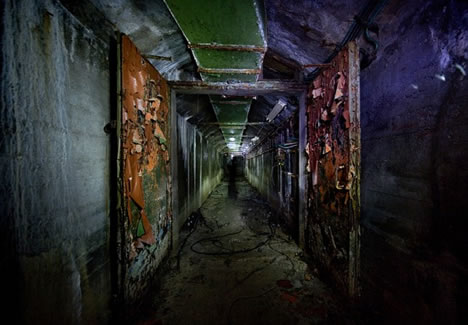
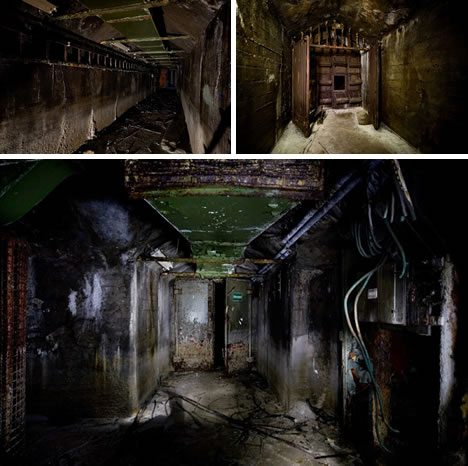
(image credits:opacity,opacity,opacity,opacity)
Krankenbunker “Breuning” in Germany is an underground bunker. This air raid shelter was later expanded to include a “hospital” deep within these cement walls. Construction was never completed since it was heavily bombed by the Royal Air Force from 1941 through 1945. The abandoned underground bunker is partially flooded but traversable.Citadelle de Namur
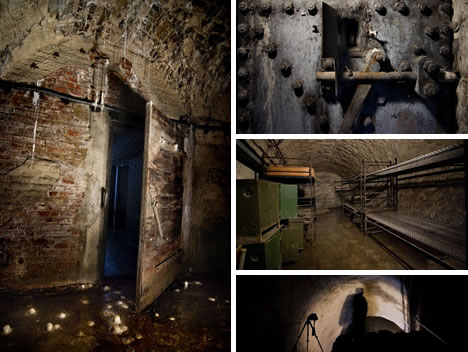
(image credits:opacity,opacity,opacity,opacity)
Citadelle de Namur in Belgium was first constructed by the Romans, but has been rebuilt many times over the centuries. The Citadel of Namur has areas like on the left where stalactites are the icicle-like formations on the ceiling and stalagmites are the deposits on the floor. Some rooms have standing water surrounding bunk beds. You never know what you might see. Maybe even a shadowman? We salute roof and tunnel hackers from their prankster beginnings to the urban explorers of today.Source
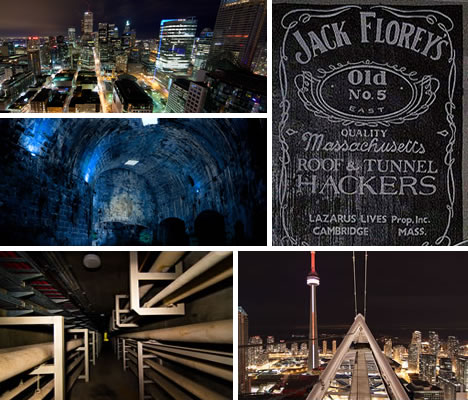
No comments:
Post a Comment